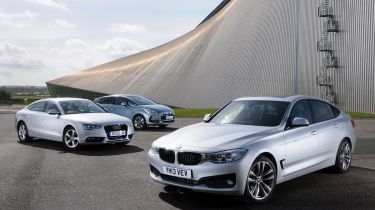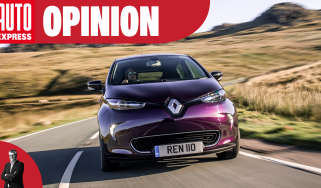BMW 3 Series GT vs Audi A5 Sportback vs Citroen DS5: 2013 group test
The BMW 3 GT offers exec style in a hatch. We test it against its rivals from Audi and Citroen

Smart design can make even the most traditional objects stand out. The stunning museum structure at RAF Cosford in Shropshire proves that an aircraft hangar can be more than a big box. In a similar vein, manufacturers have finally spiced up the compact executive sector, offering alternatives to the three-box saloon shape that’s dominated the class for decades.
The latest arrival is the BMW 3 Series Gran Turismo, which blends hatchback practicality and exec car cabin space with an upmarket image and remarkably low running costs. Audi has offered a swanky alternative to the A4 saloon since 2009, with its coupe-inspired A5 Sportback.
Yet the most adventurous car in this expanding sector is the bold DS5, which attempts to reignite Citroen’s reputation for cutting-edge design and luxury. So which of our compact executive saloon alternatives stands out most?
Verdict
With a class-leading saloon and hugely accomplished Touring estate, BMW already has a strong 3 Series line-up. However, the new Gran Turismo is a worthy addition.
This range-topping version is expensive, but it offers passenger comfort to rival BMW’s larger 5 Series and has a bigger luggage area than the 3 Series Touring. Its styling is more resolved than that of the bigger 5 GT, too, while the extra exclusivity will help you stand out from the compact executive masses.
Used - available now

2023 Tesla
Model 3 Premium
34,802 milesAutomaticElectric
Cash £18,800
2021 Toyota
Aygo
18,020 milesAutomaticPetrol1.0L
Cash £11,100
2024 Honda
HR-V Hybrid
25,898 milesAutomaticPetrol1.5L
Cash £21,495
2024 Honda
HR-V Hybrid
18,154 milesAutomaticPetrol1.5L
Cash £21,845Also, despite its additional weight and bigger dimensions, the new car largely drives like any other 3 Series, while low emissions make it a good company choice.
Still, the Audi A5 Sportback comes a close second. It’s not quite as practical, but it looks great and is good to drive. Only a firm ride and slightly dated cabin styling hold it back. Unfortunately, the DS5 is outclassed across the board, and finishes third by some margin.
First place: BMW 3 Series GT
Want a BMW that combines space and style? The 3 GT is a strong choice. Keen drivers will notice it’s heavier than the saloon, yet it’s refined and in most situations drives like any other 3 Series. The smart and practical cabin is a highlight, but you need a 320d to match rivals’ performance in this test.
The 3 Series has been the linchpin of the BMW success story for more than three decades. Now, a third model joins the already well established saloon and Touring estate versions.
Sat at the top of the range, the Gran Turismo is around £1,300 more expensive than the Touring, and follows the high-roofed, stylised hatchback concept introduced with the bigger 5 Series GT. However, from first sight the newcomer has a more cohesive look than its ungainly older brother.
Bigger headlights and a reprofiled bumper ensure that the familiar 3 Series face is in proportion to the GT’s much larger dimensions, while the sloping roofline dominates the view in profile.
And although the 3 GT is a considerable 81mm taller than the Touring, it still manages to look remarkably sleek.
At the rear, the rounded tail attempts to disguise the 17mm-wider body. Coupe-inspired details such as the frameless windows and optional glass roof add some style, too. In addition, Sport models like ours come with gloss treatment on the B-pillar, bumper trim and front air inlets.
Yet the thing that really marks out the GT is a wheelbase that’s been stretched by 110mm over the Touring and saloon. This gives more legroom than in a 5 Series saloon, plus there’s more space than in either competitor in this test. Better still, the car’s height increase means there’s also plenty of headroom.
A wide rear bench ensures there’s a lot of shoulder space, too, but the big transmission tunnel makes the middle seat uncomfortable on long trips. Still, the seatbacks adjust for rake, and overall passenger comfort is among the best you’ll find in a BMW.
Practicality is good, too. The 520-litre boot is 25 litres bigger than the Touring’s, while the wide hatch makes loading easy. The seatbacks can be tumbled from both the passenger compartment and the boot, while the maximum luggage capacity is 100 litres up on the Touring’s, at 1,600 litres. Sport models get an automatic tailgate as standard, too.
The good news continues up front, where the simple execution and smart design fare well against the over-complicated styling of the Citroen. Excellent quality is matched to solid materials, while the optional sat-nav has clear mapping and is great to use.
With a wide range of adjustment, the driving position is comfortable and familiar, although as you sit 59mm higher than in other 3 Series, you get a slightly raised view of the road. Not that you’d notice this from the driving experience, as most of the time the GT feels largely indistinguishable from other versions of the BMW compact exec.
Fast, well weighted and accurate steering is matched to precise handling and excellent stability at speed. Really push on and you’ll feel the car’s extra bulk, but the controls are perfectly weighted, while the Sport and Sport + settings on the standard Drive Performance Control load the steering and sharpen the throttle even further.
Not only does the BMW outhandle its rivals, it’s also more comfortable. This is largely down to the £750 optional adaptive dampers, which help the GT effortlessly soak up bumps. The £790 optional 19-inchwheels react to potholes, but in general the relaxing ride impresses.
Due to its modest 141bhp output, the 118d GT doesn’t have the performance to match the 175bhp Audi, although you can solve the problem by spending an extra £1,400 to step up to the £33,410 320d Sport, which delivers 181bhp from the same 2.0-litre four-cylinder engine. Even so, our test model feels eager on the road and was nearly as fast as the more powerful DS5 on our track test.
Sticking with this less powerful 118d also keeps your CO2 emissions down to 119g/km, which makes the BMW the cheapest company choice in this test. And although there’s a little bit of rattle at idle, the car is refined on the move, especially when you stay in the sweet spot between 2,000 and 3,500rpm.
Better still, we averaged 41.5mpg, and fixed-price servicing and decent residuals make the 3 GT a strong choice. It’s clearly a worthy addition to the line-up. The question is whether all this is enough for it to win.
Second place: Audi A5 Sportback
With its coupe looks and practical hatchback layout, the Audi A5 Sportback has plenty of appeal. In 175bhp 2.0-litre TDI trim, it also benefits from a big performance advantage over the 318d. It comes second here because of its firm ride and dated-looking cabin.
At the launch in 2009, Audi called the A5 Sportback a modern embodiment of the grand tourer – a model designed to blend coupé style with saloon comfort.
Four years on, with the benefit of a very mild facelift in 2011, it still looks great. Lower, longer and wider than the A4 saloon, with a roofline that’s only 19mm higher than the A5 Coupe’s, the five-door has an aggressive front end that’s virtually identical to the two-door’s.
It looks svelte next to its taller rivals, and the frameless windows, curved roof and tidy rear end all add to the smart, coupé-like image. As you’d expect, the cabin’s neatly laid-out and smartly trimmed, while the driving position is perfect.
However, it’s beginning to look a little bit old-fashioned compared to the interiors of newer Audis such as the A3. There’s nothing wrong with the top-notch quality, but the dated dials and last-generation sat-nav betray the car’s advancing years.
Passengers don’t fare too badly, though, as the 2011 update saw the arrival of a three-seat back bench, while head and legroom are similar to the Citroen’s – although both lag behind the cavernous BMW’s. The sculpted rear seats are supportive, even if the middle passenger’s comfort is compromised by the intrusive transmission tunnel. The Audi’s hatchback versatility, long 480-litre boot and split-fold seats are further bonuses.
Our smooth 175bhp 2.0-litre TDI has a performance advantage over the 318d and was quicker at the track, while on the road it felt more responsive. A less powerful 134bhp TDIe is available, but it’s only £505 cheaper to buy than the model tested here.
Unfortunately, despite small 17-inch rims and standard non-sport suspension, the Audi has a firmer set-up than the 3 Series. As a result, there’s a rigid edge to the ride. Still, it’s not crashy like the Citroen, and overall refinement is good, with very little road and wind noise disturbing the calm of the cabin.
Impressive handling and body control plus plenty of grip mean the front-wheel-drive Audi is capable in corners. However, compared to the 3 Series GT it seems a little detached, and the electromechanical steering isn’t as natural as the BMW’s, with a slightly artificial feel and inconsistent weighting.
Yet given its performance advantage, the Audi’s CO2 emissions of 120g/km are impressive, plus we averaged close to 40mpg over the course of our test. Factor in strong residuals of 54.3 per cent and a standard kit tally that includes cruise and climate control, navigation, Bluetooth, parking sensors and leather seats, and the well equipped SE Technik makes a strong financial case for itself. Will that be enough to offset its slightly dated cabin and numb driving dynamics?
Third place: Citroen DS5
Choose the Citroen DS5 and you’ll get lots of standard kit and head-turning styling. However, a chassis that delivers a rigid ride and slow-witted handling let it down, while high CO2 emissions and poor residuals make it a costly choice.
Citroen has a long history of daring to be different, so it’s no surprise that the DS5 stands out in the normally conservative compact executive sector. But this rather unique model is arguably the closest car in concept to the new 3 Series Gran Turismo.
As with the BMW, the DS5’s tall stance blends coupe-inspired styling with MPV-like dimensions. In fact, beneath the shapely body lies the family-friendly Peugeot 3008’s underpinnings.
Bold details such as the chrome bonnet strips that run up to the mirrors, the huge double-chevron grille and sloping tailgate with integrated spoiler help the Citroen stand out. In DSport trim, snazzy 18-inch rims and LED running lights add to the car’s head-turning ability, as do the panoramic glass roof and £730 pearlescent paint.
The adventurous approach continues inside, where the bold design features buttons on a central spine set into the roof, plus an eye-catching, retro-themed dash clock. Quality is better than in cheaper Citroens, and it’s easy to see the modern designer look the company was aspiring to. The execution is poor, though.
Over-complicated switches are randomly scattered, while the navigation is clumsy to use and the motorised sunblinds for the glass roof add complexity. Worse still, visibility is dreadful. The high sides and cab-forward design make placing the car on the road hard, and even with the quarterlight windows you get nasty A-pillar blind spots. The tiny rear screen makes reversing a challenge and, with the small side windows, contributes to the claustrophobic feel in the back seats.
On the plus side, the sculpted outer chairs are comfortable, and while there’s not as much legroom as in rivals, the flat transmission tunnel means passengers in the middle seat have some footroom. Also, although the DS5’s 465-litre boot is 55 litres smaller than the BMW’s, its 60:40 rear seats do fold fully flat.
On the road, the Citroen feels more like an MPV than a sporty executive saloon. Nose-heavy and lazy, with vague steering and grabby brakes, it provides little in the way of fun. This would be fine if the car had the relaxing ‘magic carpet’ feel made famous by the original fifties’ DS, but in fact it’s the most uncomfortable of our contenders.
Its unyielding suspension thumps into every imperfection, sending shudders through the cabin and causing the steering wheel to buck in your hands. Refinement isn’t a strong point, either, with too much road noise on the motorway.
At least the 161bhp output of the 2.0-litre HDi gives the Citroen a narrow performance advantage over the 318d. Yet it’s the heaviest car here and emits 133g/km, making it the most expensive company choice. The DS5 also has the worst residuals – so even with its unique looks and generous kit, it’s hard to justify.
Facts and figures
| BMW 318d Sport Gran Turismo | Audi A5 Sportback 2.0 TDI SE Technik | Citroen DS5 DSport HDi 160 | |
| On the road price/total as tested | £30,910/£41,945 | £31,820/£35,255 | £28,355/£29,085 |
| Residual value (after 3yrs/36,000) | £15,919/51.5% | £17,278/54.3% | £11,512/40.6% |
| Depreciation | £14,991 | £14,542 | £16,843 |
| Annual tax liability std./higher rate | £1,111/£2,222 | £1,200/£2,401 | £1,183/£2,367 |
| Annual fuel cost (12k/20k miles) | £1,814/£3,023 | £1,892/£3,153 | £1,976/£3,293 |
| Ins. group/quote/road tax band/cost | 24/£436/C/£30 | 28/£447/C/£30 | 24/£400/E/£125 |
| Cost of 1st/2nd/3rd service | £425 (5yrs/50k) | £15pm (3yrs/30k) | £270/£470/£270 |
| Length/wheelbase | 4,824/2,920mm | 4,712/2,810mm | 4,530/2,727mm |
| Height/width | 1,508/1,828mm | 1,391/1,854mm | 1,539/1,871mm |
| Engine | 4cyl in-line/1,995cc | 4cyl in-line/1,968cc | 4cyl in-line/1,997cc |
| Peak power/revs | 141/4,000 bhp/rpm | 175/4,200 bhp/rpm | 161/3,750 bhp/rpm |
| Peak torque/revs | 320/1,750 Nm/rpm | 380/1,750 Nm/rpm | 340/2,000 Nm/rpm |
| Transmission | 6-spd man/rwd | 6-spd man/fwd | 6-spd man/fwd |
| Fuel tank capacity/spare wheel | 57 litres/run-flats | 63 litres/space-saver | 60 litres/sealant |
| Boot capacity (seats up/down) | 520/1,600 litres | 480/1,283 litres | 465/1,288 litres |
| Kerbweight/payload/towing weight | 1,540/570/1,600kg | 1,515/550/1,600kg | 1,689/441/1,500kg |
| Turning circle/drag coefficient | 11.8 metres/0.28Cd | 11.5 metres/0.29Cd | 11.2 metres/0.30Cd |
| Basic warranty (miles)/recovery | 3yrs (unltd)/3yrs | 3yrs (60,000)/3yrs | 3yrs (60,000)/1yr |
| Service intervals/UK dealers | Variable/153 | Variable/121 | 20,000 (1yr)/196 |
| Driver Power manufacturer/dealer pos. | 15th/16th^ | 10th/18th^ | 24th/24th^ |
| Euro NCAP: adult/child/ped./stars | 95/84/78/5 | N/A | 89/83/40/5 |
| 0-60/30-70mph | 9.3/9.1 secs | 8.5/7.2 secs | 8.8/7.8 secs |
| 30-50mph in 3rd/4th | 4.1/5.9 secs | 3.4/5.3 secs | 3.8/6.0 secs |
| 50-70mph in 5th/6th | 8.2/11.1 secs | 6.3/9.1 secs | 7.3/10.1 secs |
| Top speed/rpm at 70mph | 130mph/2,000rpm | 142mph/2,000rpm | 134mph/2,000rpm |
| Braking 70-0/60-0/30-0mph | 54.0/39.0/9.8m | 46.0/33.6/9.6m | 53.5/39.6/10.1m |
| Noise outside/idle/30/70mph | 72/47/63/66dB | 66/48/63/69dB | 65/45/63/70dB |
| Auto Express econ. (mpg/mpl)/range | 41.5/9.2/520 miles | 39.8/8.8/552 miles | 38.1/8.5/503 miles |
| Govt. urban/extra-urban/combined | 51.4/70.6/62.8mpg | 51.4/68.9/61.4mpg | 44.1/64.2/55.4mpg |
| Govt. urban/extra-urban/combined | 11.4/15.7/13.9mpl | 11.4/15.3/13.6mpl | 9.8/14.2/12.3mpl |
| Actual/claimed CO2/tax bracket | 182/119g/km/18% | 190/120g/km/19% | 199/133g/km/21% |
| Airbags/ISOFIX/rear parking camera | Six/yes/£300 | Six/yes/£2,660* | Six/yes/yes |
| Adaptive dampers/p’ramic roof/cruise | £750/£1,155/yes | £900*/no/yes | No/yes/yes |
| Climate control/leather/heated seats | Yes/£1,265/£300 | Yes/yes/£300 | Yes/yes/yes |
| Metallic paint/xenons/head-up display | £610/£710/£800 | £615/£1,130/no | £600/yes/yes |
| Sat-nav/DAB radio/Bluetooth | £990/yes/yes | Yes/yes/yes | Yes/yes/yes |


